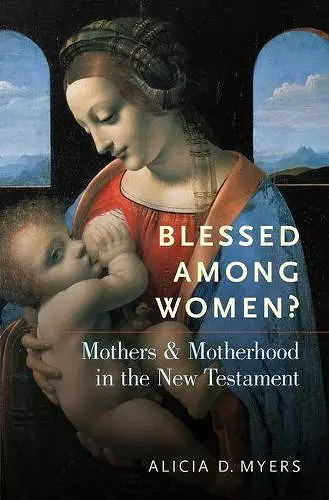Blessed Among Women?
Mothers and Motherhood in the New Testament
Format:Hardback
Publisher:Oxford University Press Inc
Published:16th Nov '17
Currently unavailable, and unfortunately no date known when it will be back
This hardback is available in another edition too:
- Paperback£30.49(9780190097011)

Mothers appear throughout the New Testament. Called "blessed among women" by Elizabeth in the Gospel of Luke, Mary, the mother of Jesus, is the most obvious example. But she is far from the only mother in this canon. She is joined by Elizabeth, a chorus of unnamed mothers seeking healing or promotions for their children, as well as male mothers, including Paul (Gal 4:19-20) and Jesus. Although interpreters of the New Testament have explored these maternal characters and metaphors, many have only recently begun to take seriously their theological aspects. This book builds on previous studies by arguing maternal language is not only theological, but also indebted to ancient gender constructions and their reshaping by early Christians. Especially significant are the physiological, anatomical, and social constructions of female bodies that permeate the ancient world where ancient Christianity was birthed. This book examines ancient generative theories, physiological understandings of breast milk and breastfeeding, and presentations of prominent mothers in literature and art to analyze the use of these themes in the New Testament and several, additional early Christian writings. In a context that aligned perfection with "masculinity," motherhood was the ideal goal for women-a justification for deficient, female existence. Proclaiming a new age ushered in by God's Christ, however, ancient Christians debated the place of women, mothers, and motherhood as a part of their reframing of gender expectations. Rather than a homogenous approval of literal motherhood, ancient Christian writings depict a spectrum of ideals for women disciples even as they retain the assumption of masculine superiority. Identifying themselves as members of God's household, ancient Christians utilized motherhood as a theological category and a contested ideal for women disciples.
Myers's particular contribution is the extensive, albeit some-what repetitive, investigation of how maternal bodies were constructed and interpreted in ancient Mediterranean contexts. Although this takes up considerably more than half of the book, it is not reflected in the title or subtitle. Nor is the fact that early Christian extra-canonical texts are also included. This fascinating background information adds considerable depth to her reading of Christian texts containing images and tropes of motherhood. * Alicia D. Myers, Journal for the Study of the New Testament *
this book is an excellent resource for both biblical scholars and practical theologians seeking background knowledge ... an insightful piece unearthing the contemporary culture's assumptions that broaden and question how we continue to interpret these important passages today. * Jo Winn-Smith, Anvil *
Blessed among Women? provides an outstanding resource for New Testament scholars. Myers's ability to pull together the varied ancient sources on physiology and philosophy makes this book a must read for any scholar or student looking at the birth/origin narratives in the gospels or the status of women in the early Christian movement. Conscious of the complex and wide-ranging nature of the material covered, Myers provides summaries at key points. Her conclusions in each chapter and at the end do an excellent job of pulling information together and drawing out implications for understanding and interpretation. I will recommend this book to my own students and use it for advanced seminars. * Matthew S. Collins, Review of Biblical Literature *
Blessed Among Women? should provide a rich-perhaps even revelatory-resource for college and divinity-school students interested in its themes. The gender analysis throughout is conventional, and many intriguing questions are left open for others to explore. * Reading Religion *
ISBN: 9780190677084
Dimensions: 157mm x 239mm x 28mm
Weight: 454g
240 pages